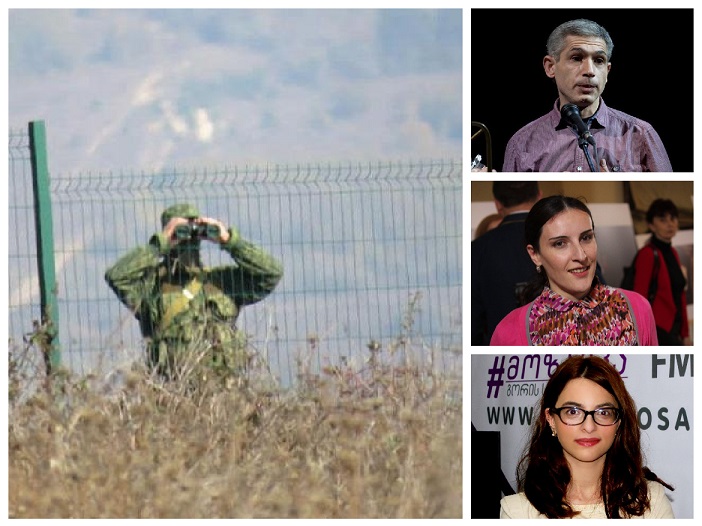Lado Bichashvili, Shida Kartli
After the 2008 Russia-Georgia war, the charge of aggression in Georgian-Ossetian relations increased. After the end of the 5-day war, the information war was continuing. The media outlets controlled by the de facto government of occupied Tskhinvali still aggressively refer to the Georgian-Ossetian conflict even after 12 years from the war. In the reports prepared by them, we find practically no neutral or objective tone, the information is always saturated with aggressive mood.
Unlike the Kremlin-controlled media outlets in the occupied territories, attitudes have changed in Georgia since the war. The only thing that has not changed is the policy of non-recognition of the occupied territories separately from Georgia, but the militaristic policy, a war rhetoric is practically no longer found in the Georgian media. This was facilitated by the Special Prize of the European Union Monitoring Mission in Peace Journalism. The award ceremony has been held since 2013 and the prize is awarded annually to those journalists whose works are aimed to the peaceful settlement of the Georgian-Ossetian and Georgian-Abkhazian conflicts.
The journalist of radio Freedom, Goga Aptsiauri received the EU Monitoring Mission Special Prize for Peace Journalism in 2014. Aptsiauri told the story of a young woman whose family was split in two parts because of the war. Part of the family, parents, sisters and brothers live in Tskhinvali, while grandparents, uncles and cousins live in one of the IDP settlements near Gori. It's been a long time since they established contact and the tragedy for this two parted family still continues. Goga says that by publishing the story, he highlighted that the war primarily hits the citizens and it is the citizens who suffer the consequences of this war the most.
Goga Aptsiauri talks about the role of journalism in resolving the conflict.
"Peace journalism is of particular importance to countries where there are conflict regions. Journalists can play a crucial role in both the escalation of these conflicts and their transformation. The language of the media may encourage conflict, so each word and the content of the prepared material carries a great importance. We still have a lot to learn in this direction. In my opinion, the main essence of peace journalism is to prepare human stories. The stories of those people who saw with their own eyes the horrors of war and of those who made sacrifices. The stories of such people make us think and push us towards thinking of peace and spare no effort to achieve it. On Georgian media platform there are few stories like this, and the emphasis is shifted to other directions. Often the media fails to cope with the political agenda and is under the influence of politics. And the voice of the people and the citizens is lost in this political noise. In Georgian-Ossetian relations, a trust in journalists can change many things. Ultimately, in the face of such trust, the possibility of verifying information emerges, and this is an important issue for informing the public. Media and journalism cannot change the situation at once, but by obtaining an accurate information we have a possibility to break down the existing stereotypes. Therefore, getting accurate information from the community living on the other side of the conflict and also informing the same community fairly is an important task," Goga Aptsiauri says.
In 2015, the EU Prize in Peace Journalism was awarded to a journalist Nino Chibchiuri. Nino has many years of experience working in regional media. Taking into account the specifics of the region, she often prepared reports in the context of the Georgian-Ossetian conflict. She says that since the August war of 2008, the Georgian media has paid less and less attention to the peaceful coexistence of Georgians and Ossetians, to mixed families, to a society torn apart by the conflict and occupation line and still maintaining contacts with each other.
"Today, unfortunately, for a large part of the Georgian journalists, the rating is more important, even if it is obtained by scandal, but I think it is important to do more historical work, especially in the age of Internet, using contacts to find common ground with Tskhinvali people, even about common problems and needs. I understand that the de facto government of Tskhinvali will prevent this, but let's start, let's try, even with apolitical topics. The media should contribute to the restoration of the contacts severed by the war," Nino Chibchiuri said.
In 2016, with the article Continuous Connection journalist Gvantsa Doluashvili received the Prize in Peace Journalism. Gvantsa says that, like the characters in her article, Georgians and Ossetians found on different sides of the conflict still manage to maintain a continuous connection.
"As a result of the August war, hundreds of people had to move away from their related persons and family members. For years, they have been unable to visit their relatives and their homes. Such a reality simply makes us to think that families torn apart by war lose each other and cut ties with relatives, related ones, although my material Continuous Connection shows that people on different sides of the conflict are not disconnected, hundreds of people call each other every day, a wired fence cannot muffle the contacts. An example of this is the relationship of 43-year-old Evelina Gobuzov, the main respondent of the article Continuous Connection, and her relationship with her relatives living in the village of Satikhari in the occupied territories. Continuous Connection tells the reader about the relationship maintained by these phone calls and makes the wire fences that keep people away from each other meaningless," Gvantsa Doluashvili said.
News
December 13, 2023
Ethnic minorities outside the peace dialogue
November 6, 2023
‘Peace’ agenda of political parties
Popular
Articles
February 13, 2024




